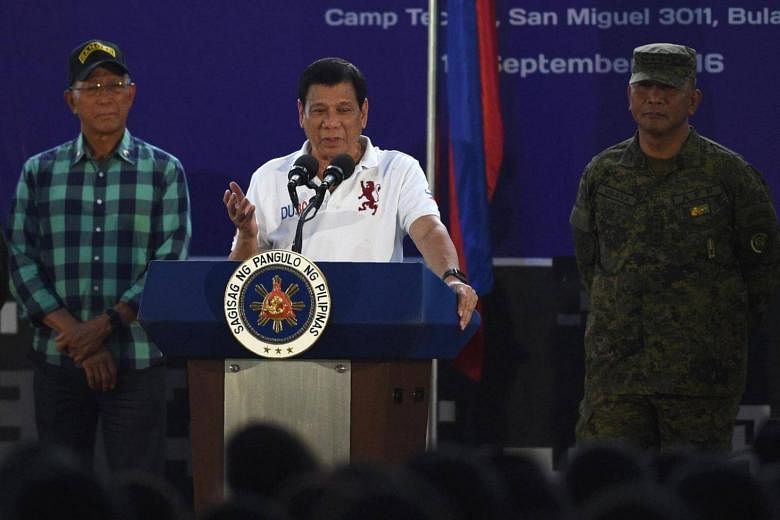In its editorial on Sept 16, the newspaper urges the President's communication team to speak in one voice, to prevent confusion.
The administration is not doing itself any favour when it fields different spokespersons to explain or interpret or elaborate on President Rodrigo Duterte's sometimes controversial remarks. As even some of his supporters have belatedly noted, message discipline is crucial.
To be sure, the administration is only two-and-a-half months old. Other administrations at this stage also exhibited similar signs of dysfunction. Six years ago, the three-headed creature that was President Benigno Aquino's communications infrastructure was one of the reasons the new administration was described, with justification, as acting like a mere student council.
But this administration's lack of message discipline is something else. Indeed, during Mr Duterte's first turn on the international stage, the level of dysfunction led to global embarrassment and international incidents.
Presidential Communications Secretary Martin Andanar has apologised for his office's shortcomings. In particular, he has made a sincere apology for the Presidential News Desk's inexplicable release of a press statement announcing what turned out to be a piece of fiction: That at the Asean Gala dinner in Laos, President Duterte would be seated between US President Barack Obama and United Nations Secretary-General Ban Ki Moon.
If this unusual seating plan had been followed, it would have been truly newsworthy. Obama had cancelled a scheduled bilateral meeting with Mr Duterte because of intemperate remarks directed at him by the new leader of the Philippines; Ban heads the world's primary multilateral organisation, which Mr Duterte had threatened to leave.
"I'd like to say that we regret that that happened and I take full responsibility for what happened. I'm also a media person, I understand what happened and the effects of a bum steer. That's not good," Andanar said, to his credit.
But the news release, and the recent fiasco in the production of a social media graphic to mark the 99th birthday of the late dictator Ferdinand Marcos, only served to fan swirling doubts about the competence of the President's communications team. But these doubts arose because of the fundamental problem: The President speaks, often off-script, and several spokespersons then try to explain his remarks, or interpret them, or elaborate on them.
Take, for instance, his ill-advised decision to lambaste Obama even before leaving for Laos. He may have been provoked by the possibility, embodied in the question raised, that Obama would express concerns about human rights violations in his so-called war on drugs-but he became agitated and got personal.
The irony was thick: He didn't want human rights to be the topic of discussion in his first official journey abroad, and yet, even before leaving the country, he managed to ensure that his stance on human rights would precisely be the talk of the town upon his arrival.
That the administration had several people trying to decode him made the problem even worse. Andanar said the real context of the President's remarks was a reassurance that the Philippines valued its relations with the United States; the Department of Foreign Affairs spokesperson said the President was looking to "iron out differences" with his American counterpart; Labour Secretary Silvestre Bello belittled the significance of the controversial remarks and the subsequent cancellation by describing Obama as a "lame duck"; and chief presidential legal counsel Salvador Panelo-as is his wont-turned things upside down and said the United States was guilty of "misreading" the President's statement.
The first version is transparently a rationalisation; the second an attempt to move things forward by focusing on next steps; the third a completely unnecessary insult (adding to the original); the last is an absurdity.
The President's communications team can begin speaking in one voice by forbidding Panelo from speaking publicly on matters beyond his scope of concern. (And even then, the President's lawyer-friend has proven his ability to say more than he should.) It can instruct the President's many alter egos to refer queries to one spokesperson, preferably a subject expert.
And it can issue reminders that its true role is not so much to defend the President at all times, although that is part of it, as to ensure that he and his various publics understand each other.
* The Philippine Daily Inquirer is a member of The Straits Times media partner Asia News Network, an alliance of 21 newspapers.

